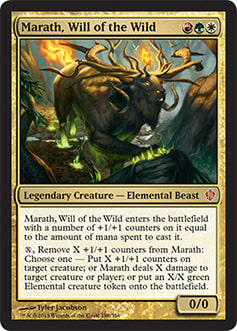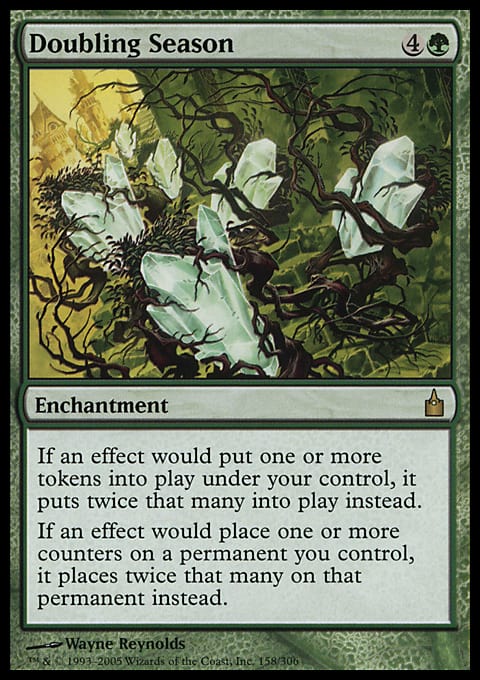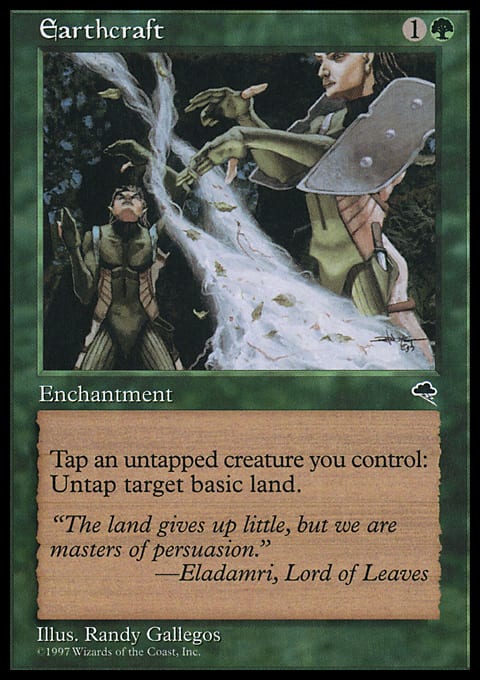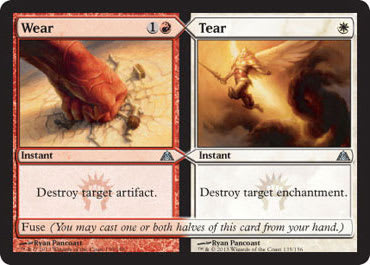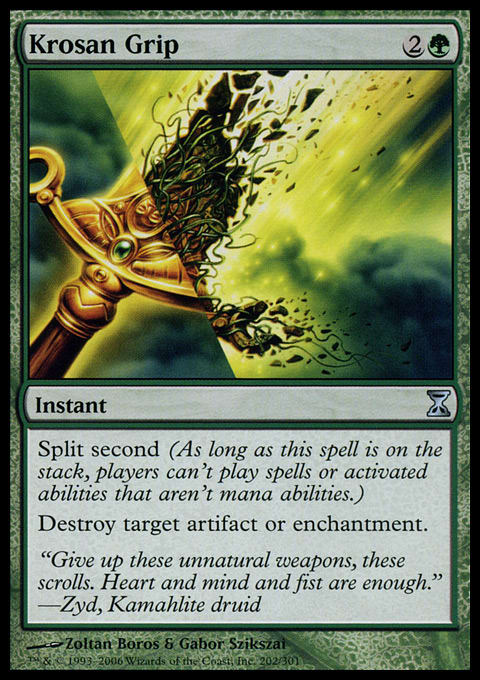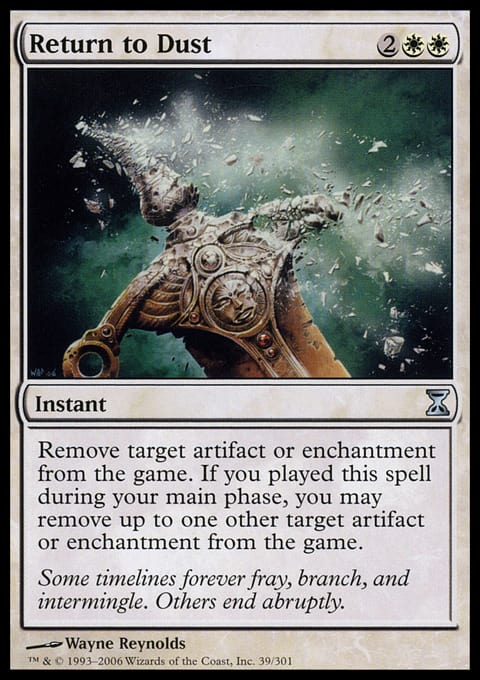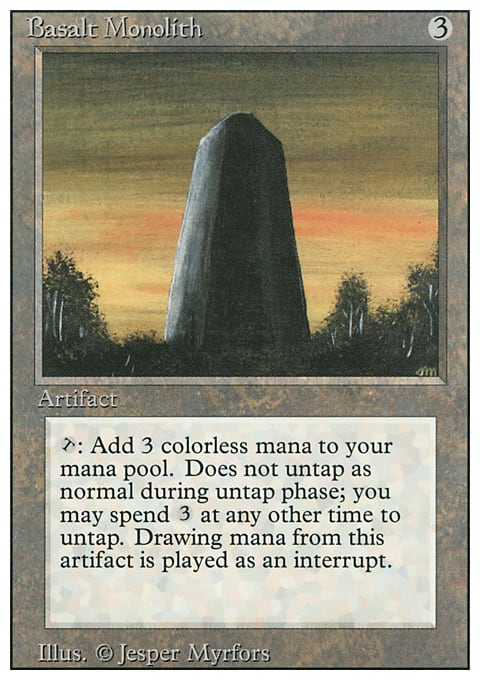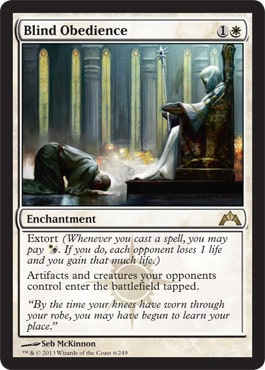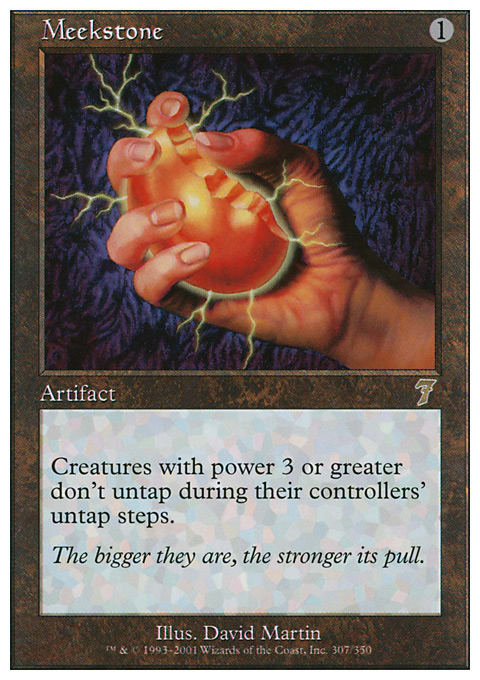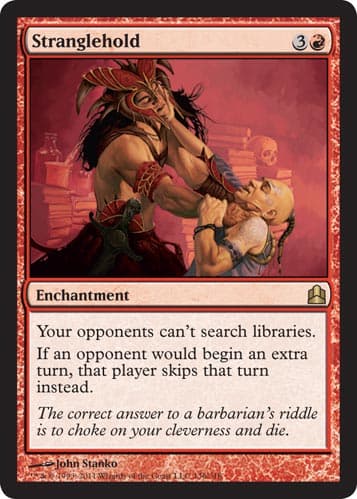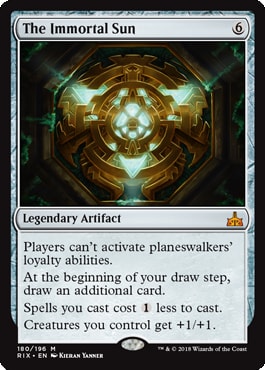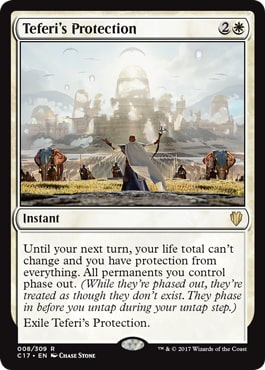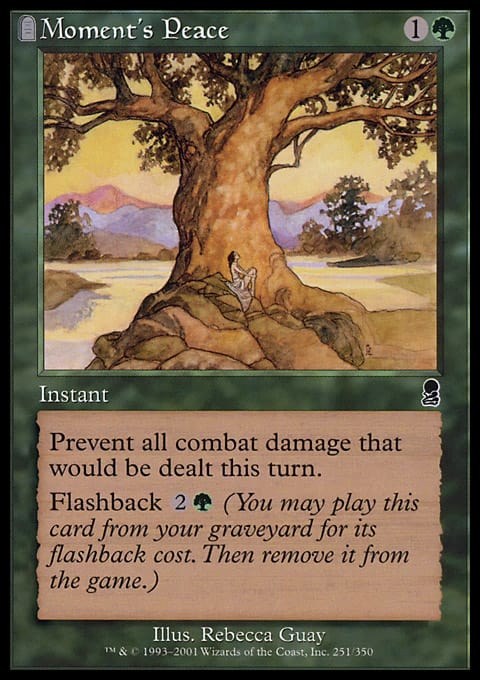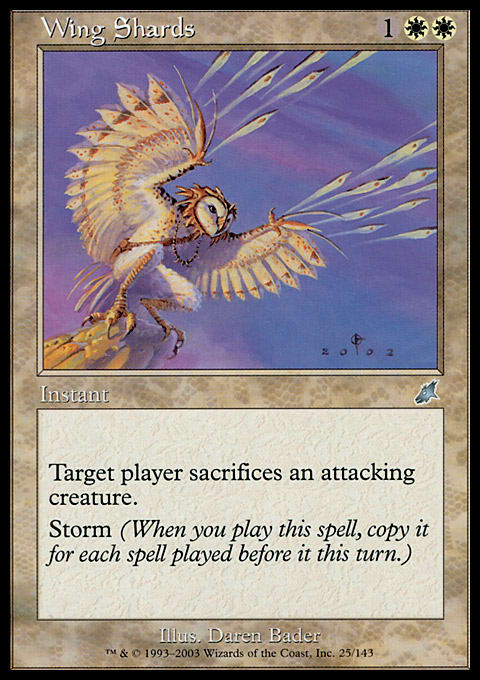
A Wild Scene by Thomas Cole (1831). Skitter Eel by Mathias Kollros.
For the past three weeks I've been writing columns with the goal of preparing for the upcoming War of the Spark Magic expansion set. We're going to get 36 new Planeswalkers and while there's no guarantee that our format will be changed forever, it is likely that we're all going to see more Planeswalkers on our battlefields than ever before.
After a look at my own thoughts about how to fight against and make the most out of Planeswalkers, I sat down last week with Stephen Hinkle, an experienced Superfriends Atraxa pilot and did my best to glean as much knowledge out of him as possible about piloting this unique style of deck. This week I was able to sit down with Stephen's brother, Mike Hinkle, who runs NexGen Comics with him. While Stephen is one of the best Atraxa pilots I know, Mike is one of the best Commander control players I've ever played against.
Today I'm going to wrap up my "Preparing for War" series with notes from conversation I had with Mike about his best control deck and how he approaches dealing with Planeswalkers. We'll be taking a close look at his Marath, Will of the Wild deck but first let's get to know its owner.
Meet Mike Hinkle
After Stephen Hinkle has wrapped up a day of work at NexGen Comics, he hands the store off to his younger brother Mike, who holds down the fort during the much busier evening hours where every night brings a different challenge. Thursday nights are Modern nights. Tuesday nights see Commander players fill up the tables. After a new set is released, Wednesdays see a lot of "double draft" nights and Fridays are when Standard players regularly fill up the shop.
He started playing Magic around Arabian Nights, but he was just a kid back then so Mike, his brother and their friends were playing with big 200 card decks and little understanding of how the game is supposed to be played. Over twenty years later, Mike not only shares in running a store, he is also a Magic Judge and fields all manner of questions with significantly less eye-rolling than many judges in our area. He's always willing to step out of a game or away from what he's doing if someone needs a judge ruling.
He wound up taking a break from the game for many years and only got back into Magic when his family started up NexGen Comics. That's also when he started to play Commander.
Mike has six Commander decks - Marath, Will of the Wild, Dakkon Blackblade, Kamahl, Fist of Krosa, Aurelia, the Warleader, Kaalia of the Vast and Kangee, Aerie Keeper. Of the six, Kangee is probably the most casual. It's a birds deck and it's his first choice to loan out to someone newer to the game, as it has a pretty straightforward game plan. The rest of his decks all have fairly strong control elements, but Marath is both his best and favorite of them all.
At some point in the early days of Commander he actually played Marath in a Grand Prix Commander tournament. It was years ago, but he told me he thinks it was in Philadelphia, and he remembers five pods of commander players. He was able to pilot his Marath deck to victory in the tournament, but he said they didn't even award Planeswalker points. He was a little fuzzy on the details, as it was years ago.
In the EDH League I run, Mike was able to win the April 2016 point total in the league's third month of play, winning with Marath by a fairly wide margin. Marath is well suited to earn points in a league system that cares about things like the size of your army and the power and toughness of your biggest creature, as Marath can go infinitely wide and grow arbitrarily large when the deck combos off.
He told me if he were to jump back into league play now he would likely have to rework the deck. He used to have well over a 50% win rate, but the caliber of decks in our meta has gone up quite a bit since those early days. He also hasn't updated it with any cards from recent sets, so there are definitely new cards he would want to throw into the mix.
Meet Marath, Will of the Wild
Before we jump into a look at Mike's deck we should take a look at Marath, Will of the Wild.
Marath is a 0/0 Elemental Beast who costs ![]()
![]()
![]() . When cast, Marath enters the battlefield with +1/+1 counters equal to the amount of mana spent to cast it. That means that as your commander tax goes up, Marath will get more powerful. He'll start out as a 3/3 and with each subsequent casting he'll be two +1/+1 counters stronger.
. When cast, Marath enters the battlefield with +1/+1 counters equal to the amount of mana spent to cast it. That means that as your commander tax goes up, Marath will get more powerful. He'll start out as a 3/3 and with each subsequent casting he'll be two +1/+1 counters stronger.
When it comes to party tricks, this legendary Elemental Beast is both powerful and versatile. You can pay X mana, remove X +1/+1 counters from Marath and choose one of three abilities. You can put X +1/+1 counters on target creature, you can deal X damage to target creature or player, or you can put an X/X green Elemental creature token onto the battlefield.
This ridiculous combination of abilities makes Marath a very mana hungry commander. The more mana you make, the more value you can squeeze out of his activated ability. Much like Ghave, Guru of Spores, Marath is an amazingly powerful combo piece that with the right boardstate can just win games.
How to Pilot Marath
Just because a deck can win games doesn't mean you always push for the win as quickly as possible. When Mike plays Marath he generally ramps a lot, works hard to control the board to keep anyone else from winning or "ruining the game" and the combos off when he feels like winning. When his friends are having fun or he's not sure he can get through his opponent's answers, he will sometimes wait until he is sure he can close out the game.
The classic Marath wincons use combo pieces like Ashnod's Altar, Doubling Season, and Earthcraft to set up a boardstate where you can make infinite mana. At that point you can pay mana to put an arbitrary number of counters on Marath and then use them to ping your opponents to death. Marath decks can also win by going to combat with a huge board of huge creatures. You can use a card like Cathars' Crusade to turn a non-infinite amount of mana into a pretty decent army of Elemental creature tokens if that's how you like to play, but Mike rarely bothers to go to combat when he's closing out a game.
Generally instead of playing out combo pieces he will keep them in his hand until he's ready to play them out and go for the win. When they're out they can be interacted with, but if they're in his hand they are generally much safer.
The strange thing is that when I asked Mike how the deck wins, he briefly mentioned combo pieces and then said that he doesn't actually mulligan to try to get those combo pieces. The deck usually does combo off to win the game, but when he mulligans he is usually looking for interaction. What Mike wants to do is stop other people from winning the game first. Eventually he wants to combo off, but if he spends the early and mid-game on defense his opponents will usually have exhausted their interaction by the time he's ready to go for the win himself.
If he's playing against a true cEDH deck, Mike will mulligan to get low-cost interaction so he has some early interaction. Swords to Plowshares, Stranglehold, and an early Mana Crypt, for example, would give him the ability to respond to decks that might try to win on turn three. Keeping an opponent from searching their library can go a long way towards stopping a cEDH deck by forcing it to play fair.
Mike genuinely cares about games being fun for everyone, so he avoids really oppressive strategies like Mass Land Destruction. Instead of shutting down his opponents entirely, he tries to slow them down by playing cards like Containment Priest. He wants to stop anyone from cheating threats into play, and also tries to force opponents' creatures to enter tapped or stop them from untapping. The answer he needs will always depend upon the decks he's playing against, but in general he wants to make it as difficult as possible for opponents to win the game, especially out of nowhere. Mike wants to give himself the time to interact with threats before they can win or knock him out of the game.
What that means is that he loads up on artifact and enchantment hate like Wear // Tear, Krosan Grip, and Return to Dust so he can remove combo pieces at instant speed. He runs ways to tap his opponents' creatures and runs Kozilek as mill prevention so he can't get milled out. He also leans heavily towards modal spells like Dawn Charm and Naya Charm as they provide a lot of flexibility.
It's telling that when asked about how the deck wins, Mike immediately talked about all of the answers he runs instead of talking about how he actually kills his opponents.
Marath is a combo piece with a bunch of other cards and with infinite mana you can ping any opponent who doesn't have hexproof, so the question of how you win with Marath does pretty much answer itself. You make infinite mana or infinite creatures or both, and you can deal direct damage from your commander to kill the table.
The fact that Mike thinks of his control strategy as how he wins is important. Most of us would think about your wincon as the elements of your deck that deal damage in some way, but none of that matters if someone else has won the game before you get to your own wincon.
This is especially important if your deck isn't designed to be good at winning early in the game, or you just don't think your friends enjoy games in which you combo off before turn five. Some groups are into that, but many like to have longer games where more stuff happens and everyone feels like they had a chance at some point even if they don't come out victorious.
In a nutshell, while there are combo pieces that win you the game, the real wincon in this Marath build are the control elements that get you to the point in the game where you can actually try to win.
If Mike isn't able to combo off with other wincons, the deck does run Purphoros, God of the Forge but his list is missing Impact Tremors, so my best guess is that winning by infinite ETB triggers isn't a central part of his strategy.
[3-card strip: Illusionist's Bracers, Mana Reflections, Basalt Monolith]
If other combo pieces aren't available, Illusionist's Bracers works nicely with Marath and in a pinch he can always pair up Mana Reflections and Basalt Monolith to make infinite mana. If for some strange reason Marath is unavailable and he can't find removal for whatever is keeping his Elemental Beast offline, he can always pump infinite mana into Walking Ballista to try to close out a game.
Those aren't really the wincons, though. I think my takeaway was that the wincons are really the interaction he runs that lets him get to the point in the game where he can actually go for the win.
Playing Politics
While Mike does win a lot of games with his Marath deck, there are cards he won't run.
As an example, Mike told me he is not a fan of Aura Shards because of how oppressive it can be. Players hate having their stuff blown up and Mike's goal isn't to keep his friends from having anything good on the battlefield. He just wants to keep everyone off of their wincons.
He doesn't want to be the player who is out ahead of everyone else, and in part that means that so long as you're not about to win he doesn't want to blow up your stuff. He just tries to extend the game and the table pretty much always wants the player about to win to get stopped. By running a ton of interaction, Mike is usually able to stop those attempts to win, so he's actually currying favor from his tablemates. Because he put so much effort into "saving the table" in the earlier parts of the game, his opponents aren't usually quite as upset when he eventually goes for the win.
Sometimes he goes easy on a table. If everyone is having fun, Mike doesn't always go for it. He nearly always plays Commander with his friends and often just wants to hang out and not combo off immediately if he's not in the mood to do so. He's won enough games that he has nothing to prove, and for him it's now more about enjoying the game than notching another win.
Having that kind of approach likely results in fewer negative reactions when he breaks out his Marath deck for a game, even though it still has a pretty high win rate. There are less eye rolls and "not THAT deck again" reactions from his friends than if he were to always go for as quick and crushing a victory as possible.
Before a game starts, his friends do often identify him as the player they all need to stop if anyone else is going to have a chance to win the game. Once the game actually starts, as other players are making moves and threatening plays, the players who were pointing at Mike usually find themselves dealing with those other opponents and forgetting their intention to stop Mike from winning at all costs. He isn't going to go for an early win anyways, so he gives other players time to make themselves into distractions. Mike helps keep everyone in check, and as a result he's often able to find a point in the mid-to-late game where he can find an opening and go for the win himself.
Mike strategy doesn't always work. Marath isn't in Blue and he isn't running off-color counterspells. Boardwipes and removal aren't always enough to get the job done.
One important thing Mike told me is to keep in mind is that players will often waste their resources too early. They will deal with threats that aren't actually game ending and will blow through their answers on things that aren't really threats so that when he is ready to go for the win, everyone else has usually exhausted all of their interaction. If someone else casts something that doesn't win the game and won't knock him out of the game, he pretty much leaves it alone. He won't waste a Swords to Plowshares on a 15/15 trampler that won't be lethal even if it's coming his way. He'll save that removal for a Selvala, Heart of the Wilds because Selvala would probably just end the game.
When asked if he has ever not gone for the win at all, Mike admitted that he has had games where he didn't go for it, essentially allowing someone else to win. I've done that too, and from my perspective that's an indication that he's playing the game in the right way and for the right reasons.
In a casual setting there will be times when someone is having a bad day or things aren't going well in their life and they just really need that victory to lift their spirits. Sometimes knowing you could have won the game is enough, and allowing someone else to have a victory is a gift and a kindness you don't even have to (and probably shouldn't) tell them about. You just keep your answers in your hand and enjoy seeing them be happy to have gotten the win. I wouldn't suggest doing this often, but every now and then it's a really nice thing to do, especially if you tend to win way more than your "fair share" of games.
Learning Control
When asked how a new player can learn to be better at assessing threats in Commander, Mike basically just chalked it up to lots of practice.
When he first got into Commander Mike lost a ton of games. Then he started to identify decks that he hated losing to and would rework his decks to be able to deal with those decks. That would wind up leaving him weak to other strategies and he'd wind up losing to those decks. Eventually he started asking himself what types of cards and commanders would work against all of the decks that he found himself losing to and that's what led him to Marath, Will of the Wild.
If you're not good at figuring out what threats are worth interacting with, Mike suggested that in any healthy meta you should be able to just ask. At most tables players will be happy to help identify what needs to be taken out, and you will sometimes even have an opponent who will point at their own permanents or spells and identify the ones that really should be dealt with.
Mike did admit that it can be difficult. When someone does something crazy, it's very easy to just respond to the crazy thing they did even if that isn't a direct threat to you. If someone plays some ridiculously big creature, there's no need to remove it until you know that it's headed in your direction. At that point you still want to wait until just before damage is applied, in case your opponent is going to throw in a pump spell or combat trick of some sort.
Playing counterspells can be harder because control players can often feel like they have to deal with potential threats before they know if the threat is going to be directed at them. They have to counter the big creature that they can't deal with once it hits the field if they know that's going to be their only option and they can't get an assurance that it won't be sent their way.
It's also sometimes worth taking damage rather than using interaction so that you're able to interact with truly game-ending boardstates later on.
When asked if there's such a thing as too much control, Mike did say that his Dakkon Blackblade deck used to sometimes have so much control that he would wind up unable to actually win the game.
Top Three Control Cards
While our conversation meandered quite a bit, I make sure to ask Mike if he could tell me what his top three control cards might be. He said that he doesn't run Runed Halo, but feels that it's worth mentioning. After a moment, he gave me his three.
Blind Obedience will force your opponents' artifacts and creatures to enter the battlefield tapped. That doesn't stop anyone from playing the game but is meant to give him time to remove anything that is truly going to be a problem. Many decks that combo off can't do so if their creatures and artifacts enter tapped. In the same vein, most decks that want to cheat in huge creatures or armies and swing at you on the same turn need to have those creatures enter untapped.
Meekstone is another way to suppress an opponent's ability to be too aggressive. If an opponent's creatures have vigilance, they'll be fine, but more often than not this works well to shut down big creature strategies. Stranglehold is simply a great way to force your opponents to "play fair", keeping them from tutoring or taking extra turns.
These cards for the most part don't stop anyone from playing the game. Mike did note that Basilisk Collar is also a fantastic card in Marath, but only because he uses it very judiciously. He doesn't just ping everyone's creatures to death for no reason, but uses it in self-defense and as always, he uses it to stop his anyone else from winning.
Unsurprisingly, the best card in Mike's Marath, Will of the Wild deck is the card that more often than not signals to the table that it's time for the game to end.
If Grand Abolisher resolves, that means a combo that will win the game is on the way and you aren't going to be able to stop it. If you counter it, you'd better have at least one more counterspell if not more because Mike is banking on using Grand Abolisher to clear the path for his wincon. By the late game he's hoping most control decks have already burned through enough counters that if Grand Abolisher gets countered he'll be able to resolve game-winning combo pieces.
Mike mentioned that he doesn't run Dragonlord Dromoka, even though it would work well to stop opponents from casting spells on his turn. The problem with Dromoka is that it costs six mana, so it's unrealistic for him to drop it and still have the mana to combo off. With Grand Abolisher he only needs to have two White mana available beyond the mana he needs for his combo pieces. The fact that it only stops opponents from casting spells is also a big deal.
Dealing With Planeswalkers
While we've done a pretty deep dive on Marath, Will of the Wild, you might be wondering how this all relates to the topic at hand - fighting back against Planeswalkers.
Mike feels like Marath is quite good at dealing with planeswalkers because he can use Marath to ping them directly and keep them away from their most powerful loyalty ability without being oppressive and just removing them entirely. His goal isn't to keep a Superfriends player from playing at all. Usually he'll let them use their "+" and "-" abilities but you pretty much always have to stop them from "ulting". When playing against decks that might be running really serious threats like Tamiyo, Field Researcher, if you know they're also running Deepglow Skate you just have to take care of it and not run the risk a walker like Tamiyo ulting.
Mike advocates running a ton of artifact and enchantment removal to deal with combo decks because most combos will involve at least one of those two types of permanents. You simply have to have answers for Doubling Season and The Chain Veil. If you're up against a planeswalker deck you have to save up your removal because those opponents will likely be digging for either or both of those pieces to try to win the game.
When asked if there were any planeswalkers that he would just allow to get to their final loyalty ability, he couldn't think of any off the top of his head. When a planewalker is out, the table pretty much needs to work together to keep it from using its best ability. If it didn't have an overpowered "limit break", it probably wouldn't be in the deck in the first place. Mike did comment that the really dangerousl planeswalkers are the best ones for trying to get help from the rest of the table. If nobody other than its controller wants a walker to ult, it's easy to get help if you're any good at all at politics.
With War of the Spark coming up and the prospect of more Planeswalkers in everyone's commander decks, Mike did mention that The Immortal Sun is going to be an important card. It shuts down planeswalkers pretty well, though he doesn't actually run it in Marath. It gives your creatures +1/+1 and that can get in the way of Marath comboing off because you have to remember to have him ping himself so he dies and can be re-cast. While that isn't generally an issue if you've made infinite mana, it does make the deck operate just a little less efficiently. It also interferes with using Skullclamp, but Immortal Sun is still a great way to deal with Planeswalkers.
In regards to running direct answers planeswalkers, Mike admitted that in Naya colors, Marath isn't as well placed as some commanders. A lot of the cards that can just remove planeswalkers are in black, so Marath simply can't run them. Instead, Mike simply relies on Marath to keep Planeswalkers from ulting.
Saving Your Butt
One last thought Mike wanted to share is that to his way of thinking every deck should have a decent amount of control.
Unless you're playing pure combo and the goal is just to win as quickly as possible, you should probably be running more interaction than you're currently running. This is especially true of creature-based decks. If you don't have interaction you're usually going to lose. If you're running interaction you can respond to game-ending threats and buy yourself the time you'll need for your creature-based strategies to work.
When asked to identify his top three "save your butt" cards, Mike gave me a few.
Teferi's Protection also fits in the same category as Grand Abolisher. Mike can use it in response to someone trying to stop him from winning and when he phases back in usually nobody will have a way to stop him from completing the combo win. In a pinch it will also save him from an untimely demise even if he isn't about to combo off.
Moment's Peace is a reliable and recurable way to stop a lethal attack and will conveniently stop a deck that wants to launch into extra combat steps. It can be flashed back so it will also handle an extra turn of aggro. Wing Shards is a fantastic way to stop most voltron decks and will get around indestructible and hexproof threats, though it won't deal with decks that go wide. Because Wing Shards can't easily be dealt with using counterspells it provides a level of resiliency that many other protection spells don't offer.
The Decklist
With Marath's ability to respond to Planeswalkers without simply shutting down a Superfriends deck entirely, and with its ample collection of boardwipes and removal spells, this list is well positioned to be able to navigate a Planeswalker-heavy meta if you can learn to hold back your answers until you really need them and can work with the table to keep all those pesky walkers in check.
Will of the Wild | Commander | Mike Hinkle
- Commander (1)
- 1 Marath, Will of the Wild
- Creatures (10)
- 1 Containment Priest
- 1 Den Protector
- 1 Eternal Witness
- 1 Grand Abolisher
- 1 Stoneforge Mystic
- 1 Solemn Simulacrum
- 1 Walking Ballista
- 1 Kozilek, Butcher of Truth
- 1 Purphoros, God of the Forge
- 1 Selvala, Explorer Returned
- Planeswalkers (1)
- 1 Ugin, the Spirit Dragon
- Instants (14)
- 1 Dawn Charm
- 1 Deflecting Palm
- 1 Enlightened Tutor
- 1 Fate Forgotten
- 1 Intervention Pact
- 1 Krosan Grip
- 1 Moment's Peace
- 1 Naya Charm
- 1 Path to Exile
- 1 Return to Dust
- 1 Swords to Plowshares
- 1 Teferi's Protection
- 1 Wear // Tear
- 1 Wing Shards
- Sorceries (18)
- 1 All Is Dust
- 1 Angelic Purge
- 1 Austere Command
- 1 Council's Judgment
- 1 Cultivate
- 1 Decimate
- 1 Descend upon the Sinful
- 1 Farseek
- 1 Final Judgment
- 1 Hallowed Burial
- 1 Ranger's Path
- 1 Rout
- 1 Seasons Past
- 1 Skyshroud Claim
- 1 Tempt with Discovery
- 1 Terminus
- 1 Verdant Confluence
- 1 Wrath of God
- Enchantments (12)
- 1 Blind Obedience
- 1 Cathars' Crusade
- 1 Doubling Season
- 1 Earthcraft
- 1 Growing Rites of Itlimoc
- 1 Hardened Scales
- 1 Leyline of Sanctity
- 1 Mana Echoes
- 1 Mana Reflection
- 1 Mirari's Wake
- 1 Nevermore
- 1 Stranglehold
- Artifacts (13)
- 1 Ashnod's Altar
- 1 Basalt Monolith
- 1 Basilisk Collar
- 1 Chromatic Lantern
- 1 Commander's Sphere
- 1 Darksteel Ingot
- 1 Illusionist's Bracers
- 1 Mana Crypt
- 1 Meekstone
- 1 Mirage Mirror
- 1 Skullclamp
- 1 Sol Ring
- 1 Tormod's Crypt
- Lands (31)
- 3 Forest
- 4 Mountain
- 5 Plains
- 1 Boros Garrison
- 1 Boseiju, Who Shelters All
- 1 Canopy Vista
- 1 Cinder Glade
- 1 Clifftop Retreat
- 1 Command Tower
- 1 Gruul Turf
- 1 Jungle Shrine
- 1 Kessig Wolf Run
- 1 Maze of Ith
- 1 Mosswort Bridge
- 1 Reliquary Tower
- 1 Selesnya Sanctuary
- 1 Sunhome, Fortress of the Legion
- 1 Temple Garden
- 1 Temple of Abandon
- 1 Temple of Plenty
- 1 Temple of the False God
- 1 Temple of Triumph
With new cards being spoiled every day, you will definitely want to look at new War of the Spark cards if you feel you need more anti-Planeswalker tech than Mike has in his current list. It's certain that we'll be seeing more answers, some of which may be well costed and flexible enough to include in any list.
Final Thoughts
If you've got your own ideas on how to best approach a planeswalker-heavy meta, please share them in comments below. There are surely commanders in Blue and Black that can provide an equivalent amount of protection against the planeswalkers that may soon be invading our gaming tables. Tell us about your go-to commander for control, especially if it's good at answering Planeswalkers.
I'm gearing up to start looking at some of the legendary creatures we're seeing spoiled so if there are any that you'd like my take on, please let me know. I'm currently leaning towards writing about Tolsimir, Friend to Wolves because I find his "Fight Club For Wolves" mechanic oddly amusing.
That's all I've got for you today. Thanks for reading and I'll see you next week!














